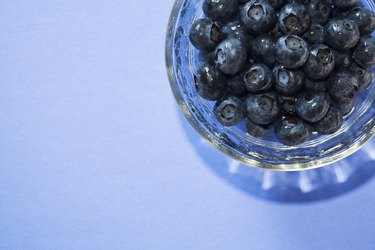
Antioxidants usually get good press for their beneficial effects helping to prevent disease, but these powerful compounds may also have a dark side. Consuming too many antioxidants in the form of supplements could lead to an increased risk of death and disease instead of having a positive effect. The difference, however, may lie in whether you get your antioxidants in supplement form or from food as part of a healthy, balanced diet.
Antioxidants
Video of the Day
Antioxidants include thousands of different compounds, including vitamin C, selenium, manganese, lycopene and beta-carotene. These vitamins, minerals and phytochemicals could offer protection against a range of diseases, including cancer, heart disease, neurodegenerative diseases and vision problems. They work by preventing damage caused by free radicals, which are produced as a byproduct of normal metabolism.
Video of the Day
Risks
While antioxidants confer many benefits, taking too much of one or a few antioxidants at once or taking high doses over a long period can lead to problems. A meta-analysis of studies done by Cleveland Clinic found that beta-carotene supplements raised the risk of mortality significantly and slightly raised the risk of cardiovascular disease. The exact dosage that can cause this effect remains unknown, but Cleveland Clinic recommends avoiding beta-carotene supplements and discontinuing other studies involving beta-carotene because of the risk. In some cases, the level of a given antioxidant that is considered too much could depend on other lifestyle factors. A study published in the November 1996 "Journal of the National Cancer Institute" found that smokers who took beta-carotene supplements had an increased risk of lung cancer compared to those who didn't take the supplement. Another well-studied antioxidant that may cause harm when consumed in excess is vitamin E. According to the Office of Dietary Supplements, doses above 150 IU per day began to raise the risk of death, with the risk rising along with the dose. Doses of 50 to 400 IU per day have been linked to an increased risk of hemorrhagic stroke.
Mechanism
The mechanism behind the protective action of antioxidants is the same one that makes them potentially dangerous in high amounts. Antioxidants work by giving away an electron to compounds that are missing one. These compounds without enough electrons are called free radicals, and they can rampage through the body, destroying cellular components in their quest to acquire an electron. An adequate supply of antioxidants halts these free radicals in their tracks, but by doing so, they actually end up lacking an electron themselves. The body normally can provide enough of its own antioxidants to quench these newly needy molecules, but excess antioxidants can disrupt this balance.
Considerations
Few studies have been done with humans investigating the potential effects of excess doses of antioxidants other than beta-carotene and vitamin E, so the effects of most of these substances remains unknown. The best solution to keep from taking in too many of a given antioxidant is to choose whole foods instead of supplements. Because antioxidants work in synergy with other components in the diet, the problem of too many antioxidants could be a result of isolating these compounds, not any fault of the compounds themselves.
- Harvard School of Public Health: Antioxidants: Beyond the Hype
- "Journal of the National Cancer Institute"; Alpha-Tocopherol and Beta-Carotene Supplements and Lung Cancer Incidence in the Alpha-Tocopherol, Beta-Carotene Cancer Prevention Study: Effects of Base-Line Characteristics and Study Compliance; D. Albanes, et al.; November 1996
- Cleveland Clinic: Antioxidants, Vitamin E, Beta Carotene, and Cardiovascular Disease
- Office of Dietary Supplements: Vitamin E